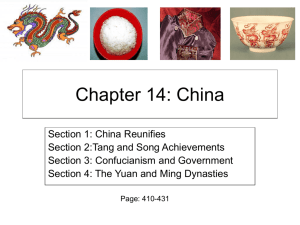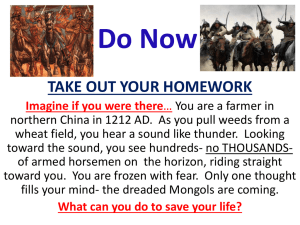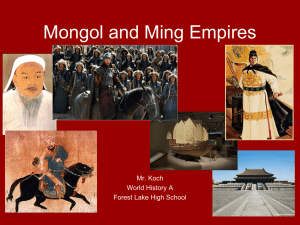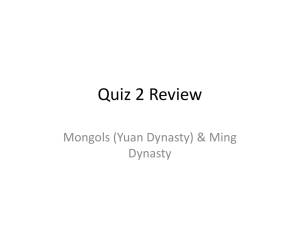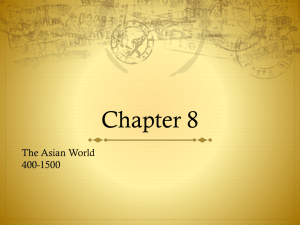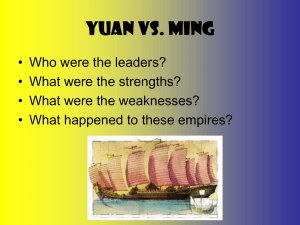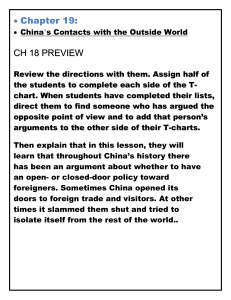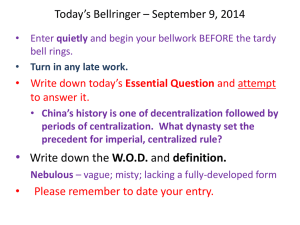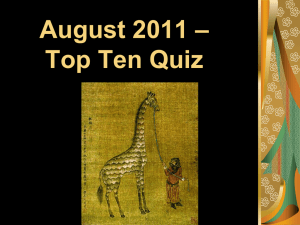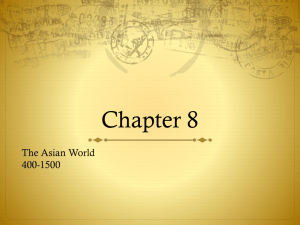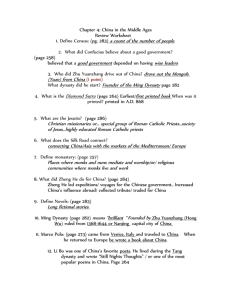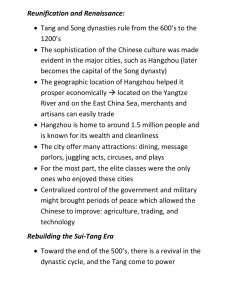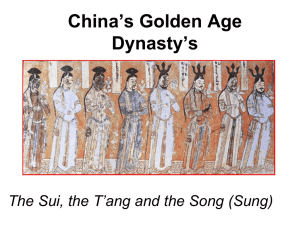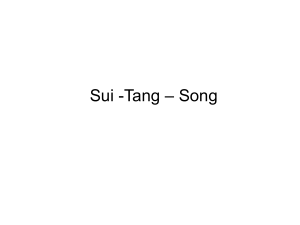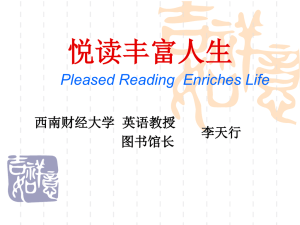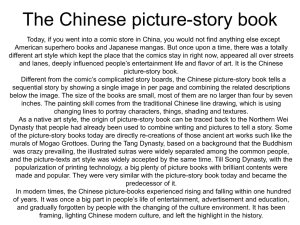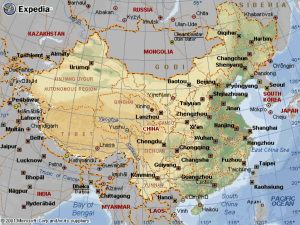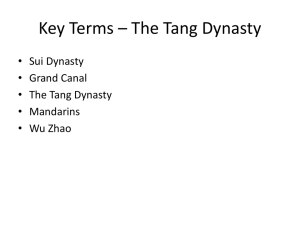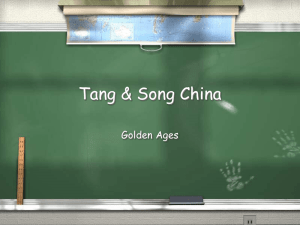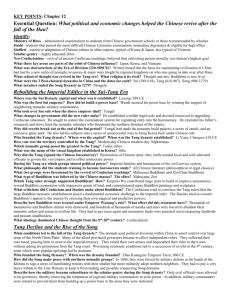Chapter 14: China - Central Magnet School
advertisement
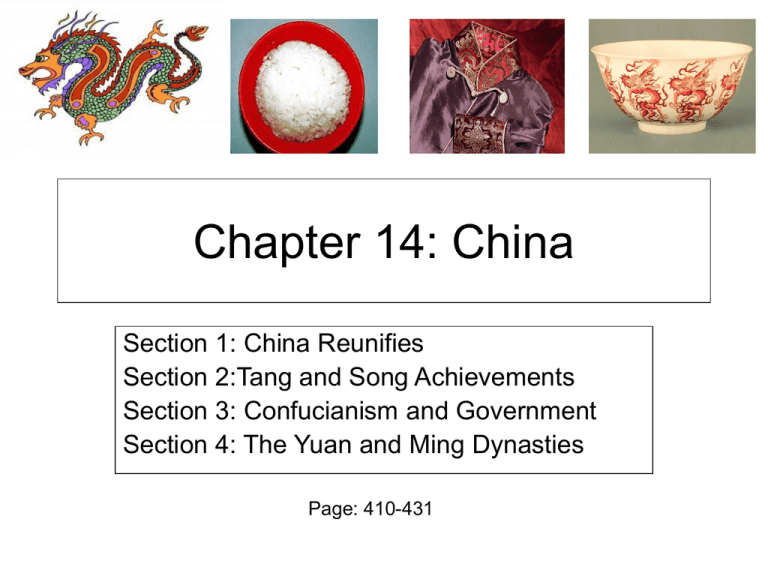
Chapter 14: China Section 1: China Reunifies Section 2:Tang and Song Achievements Section 3: Confucianism and Government Section 4: The Yuan and Ming Dynasties Page: 410-431 Section 1 China Reunifies • Period of Disunion- time of disorder in China after the Han collapsed (220-589). • Culture blending took place during this time, changing Chinese culture. Sui Dynasty (SWAY) • Yang Jian (YANG jeeen) created the Sui Dynasty and reunifies China, ending the Period of Disunion. • The Sui Dynasty did not last long (589618). Sui Achievements • Restored order to China • Began the Grand Canal, which linked northern and southern China The Tang Dynasty China’s Golden Age • Ruled nearly 300 Years • China grew its territory under the Tang • 3 Great Tang Rulers – Taizong (TY-tzoong) – Xuangzong (shoo-antzoong) – Empress Wu After the Tang • China went into another brief period of disorder. • This time was known as the Five Dynasties and Ten Kingdoms. • Disorder lasted 53 Years (907-960) The Song Dynasty Great Accomplishments • Song reunified China again. • Ruled for 300 Years, like the Tang • Buddhism grew in China and became very important to the culture during the Period of Disunion. • The Golden Age of Buddhism (400-825) • Tang emperor launched a campaign against Buddhism weakening the religion, but not bringing it to an end. Section 2 Tang and Song Achievements Tang Dynasty • Trade and Religious Capital/Largest City=Chang’an (chahng-AHN). • The Grand Canal that linked major cities, was improved • Famous poet was Li Bo • Magnetic Compass • Exports – Tea, rice, spices, jade, porcelain, SILK • Imports – Different foods, plants, wool, glass, gold, silver Song Dynasty • Irrigation Techniques – Underground wells – Dragon backbone pump • • • • Fast Ripening Rice Cotton Tea Plentiful amount of Food=Agricultural Surplus • China became the largest country in the world (100 million people) • Capital City-Kaifeng (KYfuhng) • Li Qingzhao (chingZHOW)=China’s greatest female poet Read Linking to Today Page 419 • What are some advantages of paper money? Section 3 Confucianism and Government • Confucianism-dominate and official philosophy in China – Focus: Ethics, education and proper behavior based on your role in society. • Neo-Confucianism-”new” was like the old philosophy, but also emphasized spiritual matters. • In the Song, a bureaucracy was formed through passing the civil service examinations. The people who passed these exams were known as scholar-officials. Section 4 The Yuan and Ming Dynasties Yuan Dynasty • The Mongols take over China under Temujin or Genghis Khan (Universal Ruler) • Genghis Khan united the Mongols and created a powerful army. • The Mongols conquered lands all over Asia and Eastern Europe. • Kublai Khan was 2nd ruler of the Mongols (grandson of Genghis) started the Yuan Dynasty and declared himself Emperor of China • The Chinese resented being ruled by foreigners whose culture was very different from theirs. • Kublai allowed Chinese to keep their own traditions, welcomed foreign traders, but kept Confucian scholars from gaining too much power in the government • Part of what we know about the Yuan Dynasty comes from Marco Polo’s writings End of The Yuan • Greedy for land, the Mongols decided to invade Japan. • The campaigns were disastrous. Violent storms and fierce defenders destroyed most of the Mongol army. • Weakened Army, economy, and Chinese resentment helped Zhu Yuanzhang (JOO-yooahn-JAHNG) lead a successful revolt against the Mongols, ending the Yuan Dynasty. Ming Dynasty Chinese Rule • Zhu Yuanzhang became emperor of China and this began the Brilliant Ming Dynasty. • This was considered the most stable and prosperous time in Chinese History. • Funded Great Sea Voyages – Zheng He • Forbidden City was build in Beijing • Restored the Great Wall of China • The Ming Emperors worked to rid any foreign influence in China. – In fact a new Ming Emperor made Zheng He return to China and China entered a Period of Isolationism. – China suffered due to its isolationism: lack of progress while the Western World made leaps in technology and other areas. When Westerns marched into Chinese affairs, China was too weak to stop them.
